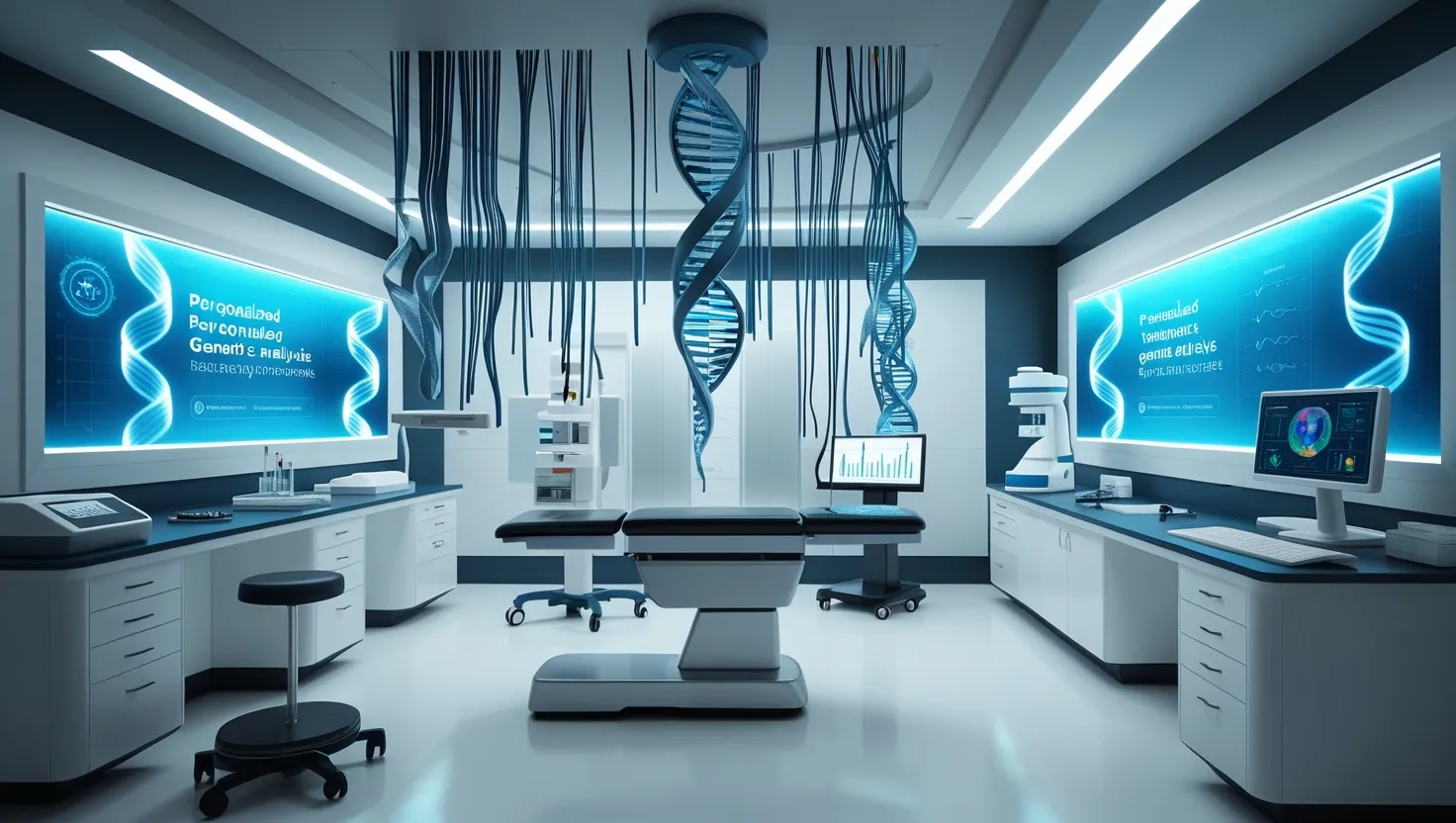As we stand at the threshold of a new era in healthcare, the landscape of precision medicine is evolving at an unprecedented pace. This field, which tailors medical treatments to the unique genetic, environmental, and lifestyle factors of individual patients, is no longer a distant dream but a tangible reality. Here are seven fascinating breakthroughs that are redefining the way we approach health and disease.
Pharmacogenomics: The Genetic Blueprint for Drug Therapy
Pharmacogenomics, the intersection of pharmacology and genomics, is revolutionizing how we prescribe medications. By analyzing a patient’s genetic makeup, doctors can predict how they will respond to certain drugs, thereby avoiding adverse reactions and ensuring the most effective treatment. This approach is not just about treating diseases; it’s about understanding the intricate dance between genes and drugs.
“As we consider the future of medicine, we must think in terms of the individual, not the masses,” notes a leading researcher in the field. This personalized approach is already showing promising results, particularly in cancer treatment where genetic variations can significantly impact the efficacy of chemotherapy.
Imagine a world where your doctor can prescribe a medication knowing exactly how your body will react to it. This is not science fiction; it’s the reality that pharmacogenomics is bringing to our doorstep.
Liquid Biopsies: The Non-Invasive Cancer Detector
Liquid biopsies are another groundbreaking innovation in precision medicine. Unlike traditional biopsies, which involve invasive procedures to obtain tissue samples, liquid biopsies analyze circulating tumor DNA (ctDNA) found in blood or other bodily fluids. This non-invasive method allows for early cancer detection and monitoring, potentially saving countless lives.
“Early detection is the key to beating cancer,” says a cancer survivor who benefited from this technology. “Liquid biopsies have given us a tool that is both precise and gentle, allowing us to catch cancer at its earliest stages.”
The implications are vast. With liquid biopsies, we can track the progression of cancer in real-time, adjust treatments accordingly, and even predict the likelihood of recurrence.
CRISPR Gene Editing: Correcting Inherited Disorders
CRISPR-Cas9 gene editing technology has been making waves in the scientific community for its potential to correct genetic defects. By precisely editing genes, CRISPR offers a promising solution for inherited disorders that have long been considered incurable.
“The CRISPR revolution is not just about treating diseases; it’s about preventing them,” remarks a geneticist working on CRISPR therapies. “Imagine a future where genetic diseases are a thing of the past because we can edit them out of existence.”
While ethical debates surround the use of CRISPR, its potential to cure genetic diseases like sickle cell anemia and cystic fibrosis is undeniable. As research advances, we are getting closer to a world where these debilitating conditions can be eradicated.
AI-Powered Diagnostic Imaging Analysis
Artificial intelligence (AI) is transforming the field of diagnostic imaging in ways we never thought possible. AI algorithms can analyze medical images with a precision and speed that human radiologists can only dream of. This technology is not just about detecting diseases; it’s about predicting them before they even manifest.
“AI is the future of healthcare,” says an AI researcher. “It allows us to see what the human eye cannot, and it does so with unparalleled accuracy.”
From detecting early signs of cancer in mammograms to identifying subtle changes in brain scans that indicate neurological disorders, AI is revolutionizing how we diagnose and treat diseases.
3D-Printed Personalized Implants and Prosthetics
3D printing is no longer just a tool for hobbyists; it’s a game-changer in healthcare. Personalized implants and prosthetics tailored to an individual’s specific needs are now a reality. Whether it’s a custom-made hip replacement or a prosthetic limb designed to match the patient’s anatomy perfectly, 3D printing is offering solutions that were previously unimaginable.
“3D printing has given me a new lease on life,” says a patient who received a customized prosthetic. “It’s not just about functionality; it’s about feeling whole again.”
The precision and customization offered by 3D printing are redefining the field of orthopedics and beyond, providing patients with implants and prosthetics that are both functional and aesthetically pleasing.
Microbiome-Based Treatments: Harnessing the Power of Microbes
The human microbiome, the collection of microorganisms living within and on our bodies, plays a crucial role in our health. Recent research has shown that imbalances in the microbiome can lead to a variety of diseases, from digestive disorders to mental health issues. Microbiome-based treatments aim to restore this balance, offering a new frontier in disease prevention and treatment.
“The microbiome is like an unseen world within us,” explains a microbiologist. “By understanding and manipulating it, we can treat diseases in ways that were previously thought impossible.”
From fecal transplants to probiotics, microbiome-based treatments are showing promising results in treating conditions that have long been resistant to traditional therapies.
Nanosensors for Real-Time Health Monitoring
Nanosensors, tiny devices that can detect changes in our bodies at the molecular level, are the latest innovation in real-time health monitoring. These sensors can track everything from blood glucose levels to biomarkers for diseases, providing real-time data that can be used to adjust treatments on the fly.
“Nanosensors are like having a personal health guardian,” says a patient who uses these devices. “They alert me to any changes in my health before they become serious issues.”
The potential of nanosensors is vast. Imagine being able to monitor your health in real-time, receiving alerts before a condition worsens, and adjusting your treatment plan accordingly. This is the future that nanosensors are bringing to our doorstep.
The Future of Precision Medicine
As we look to the future, one thing is clear: precision medicine is here to stay. These breakthroughs are not just innovations; they are the building blocks of a new healthcare system that is more personalized, more effective, and more compassionate.
“Precision medicine is not just about treating diseases; it’s about understanding the individual,” notes a healthcare expert. “It’s about recognizing that each patient is unique and deserves a treatment plan that is tailored to their specific needs.”
So, what does the future hold? Will we see a world where diseases are a rarity because we can detect and treat them early? Will we live in a society where genetic disorders are a thing of the past? The answers to these questions are still unfolding, but one thing is certain: the future of healthcare is brighter than ever, thanks to the fascinating breakthroughs in precision medicine.
As we embark on this journey, we must ask ourselves: What other secrets lie hidden in the realm of precision medicine? How can we harness these technologies to create a healthier, more equitable world for all? The journey ahead is filled with promise and possibility, and it’s up to us to explore and innovate, to push the boundaries of what is possible and to create a future where health and wellness are within everyone’s reach.






